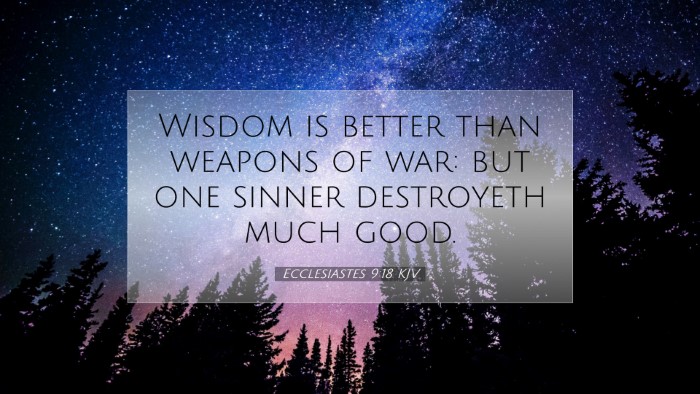Ecclesiastes 9:18 - Commentary and Insights
Verse Text: "Wisdom is better than weapons of war: but one sinner destroyeth much good."
Overview
The profound statement found in Ecclesiastes 9:18 encapsulates the essence of wisdom in the face of conflict and morality. The verse highlights the superiority of wisdom over brute force and emphasizes the destructive potential of sin. It serves as a reflective commentary on the human condition, encouraging both self-examination and a deeper appreciation of wisdom.
Exegesis of the Verse
This verse, as noted by various scholars, presents two contrasting ideas: the value of wisdom and the peril of sin. The phrase "Wisdom is better than weapons of war" posits wisdom as an invaluable asset, essential for navigating complex moral landscapes, as well as for achieving true success in any endeavor.
The latter part of the verse, "but one sinner destroyeth much good," brings a sobering realization that, despite the great value of wisdom, the impact of a single immoral act can nullify much of the good that has been accomplished.
Commentary Insights
-
Matthew Henry:
Henry emphasizes that wisdom provides strategic advantages that surpass the benefits of physical power. He notes that wisdom guides leaders in making sound decisions, which are far more effective and enduring than acts of aggression. Furthermore, he warns that the actions of one sinner can lead to widespread destruction, shedding light on the communal responsibility of morality.
-
Albert Barnes:
Barnes reiterates the notion that while war and conflict might achieve temporary goals, true wisdom leads to lasting peace and prosperity. He suggests that wisdom can avert conflict altogether, guiding individuals toward reconciliation and understanding. Barnes also highlights the potential for one person's sinfulness to overshadow the collective good, which underscores the need for accountability within a community.
-
Adam Clarke:
Clarke presents a detailed exploration of the mechanics of wisdom as it pertains to governance and personal conduct. He draws attention to examples from history where wise rulers have won the hearts of their people and maintained order without resorting to violence. In terms of sin, Clarke focuses on the ripple effect of a single person's wrong actions, illustrating how easily good can be undone by selfishness and moral failings.
Theological Implications
This verse engenders a plethora of theological reflections. It invites a dialogue about the nature of divine wisdom compared to human understanding, emphasizing that true wisdom comes from God and leads to life and peace. It also places an ethical emphasis on the power of individual actions and highlights the seriousness with which believers are to approach sin.
Wisdom, as described in Scripture, connects closely with the fear of the Lord (Proverbs 1:7) — understanding that aligns one’s actions with divine principles leads to greater good. The acknowledgment that one sinner can destroy much good speaks to the power of free will and the consequences of moral choices, which is a recurrent theme throughout both the Old and New Testaments.
Practical Applications
For pastors and church leaders, Ecclesiastes 9:18 serves as a call to cultivate and promote wisdom within their congregations. Here are several practical applications:
- Encouragement of Wisdom: Create environments where wisdom is valued, encouraged, and discussed. Offer classes and studies that delve into biblical wisdom literature.
- Promotion of Accountability: Foster a community where individuals feel responsible for their actions and understand their potential impact on the collective good.
- Modeling Conflict Resolution: Teach and model conflict resolution strategies rooted in wisdom rather than hostility, drawing from the biblical principles of reconciliation.
Conclusion
Ecclesiastes 9:18 stands as a poignant reminder of the enduring value of wisdom in a world often marred by sin. It encourages believers to strive for wisdom in their decisions and actions, stressing that while strength may defend, it is wisdom that ultimately guides to salvation, peace, and community well-being. The verse’s dual focus on the power of a wise heart and the potential harm of sin continues to resonate with spiritual leaders and believers seeking to navigate the complexities of life with integrity and purpose.


